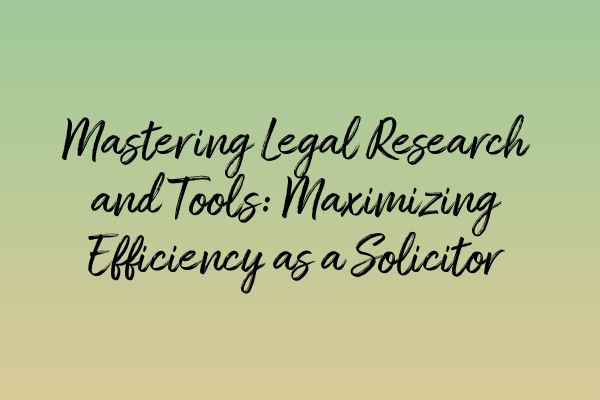Mastering Legal Research and Tools: Maximizing Efficiency as a Solicitor
As a solicitor, one of the most critical skills you can possess is the ability to conduct effective and efficient legal research. In today’s fast-paced legal landscape, staying up-to-date with the latest laws, regulations, and court decisions is essential for success. Moreover, leveraging powerful legal research tools can significantly enhance your productivity and enable you to provide the best possible legal advice and representation to your clients.
The Importance of Legal Research
Legal research forms the foundation of your practice. It involves the systematic gathering of legal information, analyzing its relevance, and applying it to a specific legal problem or case. Effective legal research empowers you to make informed decisions, develop persuasive arguments, and navigate complex legal landscapes confidently.
Without proper legal research, you risk missing critical information, relying on outdated laws, and providing inaccurate advice to your clients. In the worst-case scenario, incomplete or incorrect legal research can lead to costly mistakes, damaged reputations, and even malpractice lawsuits.
Therefore, honing your legal research skills is vital to delivering exceptional legal services. Here are a few strategies to help you master legal research and maximize efficiency as a solicitor.
1. Understand Your Objective
Before jumping into legal research, it’s crucial to clearly define your objective. Identify the specific legal issue or question at hand and understand what you need to achieve with your research. By defining your objective, you can streamline your research process and avoid getting overwhelmed by irrelevant information.
For instance, if you’re working on a case involving lease extensions and enfranchisement, understanding the complexities of the legal procedures involved is key.
Lease Extensions and Enfranchisement: Navigating Complex Legal Procedures
2. Start with Secondary Sources
Secondary sources, such as legal textbooks, law review articles, and online legal guides, can provide valuable background information and analysis on your topic. These sources often summarize complex legal principles in a more accessible manner and provide a starting point for your research.
When exploring property transactions and the legal process, for example, reliable secondary sources can help you navigate the intricacies of the legal framework with confidence.
Property Transactions and the Legal Process: Navigate with Confidence
3. Utilize Online Legal Databases
Online legal databases offer an extensive collection of legal materials, including statutes, regulations, case law, and legal commentary. These databases provide powerful search functionalities, allowing you to efficiently locate relevant legal authorities and extract the most pertinent information.
When dealing with lease laws in the UK, understanding the legal frameworks involved is crucial.
Demystifying Lease Laws in the UK: Legal Frameworks Explained
4. Use Legal Research Tools
Maximize your efficiency by leveraging legal research tools designed to streamline the research process. These tools provide advanced search capabilities, citation analysis, and document management features, among others, to boost your productivity and help you stay organized.
As a solicitor, mastering joint ownership legal considerations is essential for advising clients on co-owned properties.
Mastering Joint Ownership: Legal Considerations for Co-Owners
5. Stay Updated with Legal Developments
Legal landscapes are constantly evolving, with new laws, regulations, and court decisions being introduced regularly. It’s essential to stay updated with these developments to provide accurate and relevant advice to your clients.
When dealing with property and land matters, understanding rights of way is crucial. Keep yourself well-informed with relevant guides.
Understanding Rights of Way: A Guide for Property and Land Practitioners
Conclusion
Mastering legal research and tools is a continual process for solicitors. By understanding your objective, starting with secondary sources, utilizing online legal databases, using legal research tools, and staying updated with legal developments, you can enhance your efficiency and effectiveness as a solicitor.
Remember, the quality of your legal research directly impacts your ability to provide excellent legal services to your clients. So, invest time in developing and refining your legal research skills, and make the most of the powerful legal research tools available to you.
By continuously refining your legal research techniques, you can stay ahead in the legal profession and deliver the best possible outcomes for your clients.


Leave a Reply